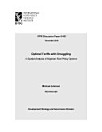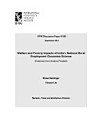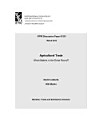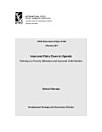Reverse-Share-Tenancy and Marshallian Inefficiency: Landowners Bargaining Power and Sharecroppers Productivity
Hosaena Ghebru Hagos · Stein T. Holden
трав. 2013 р. · IFPRI Discussion Paper Книга 1 · Intl Food Policy Res Inst
Електронна книга
48
Сторінки
family_home
Можна додати
info
reportGoogle не перевіряє оцінки й відгуки. Докладніше.
Про цю електронну книгу
While there are ample empirical studies that claim the potential disincentive effects of sharecropping arrangements, the existing literature is shallow in explaining why share tenancy contracts are prevalent and diffusing in many developing countries. Using a unique tenant-landlord matched dataset from the Tigray region of Ethiopia, we are able to show how the tenants strategic response to the varying economic and tenure-security status of the landlords can explain sharecroppers productivity differentials. To the best of our knowledge, this is the first study to use tenantlandlord matched data that accounts for both the supply (landlord) and demand (tenant) side characteristics in analyzing sharecroppers level of effort and productivity. The study reveals that sharecroppers yields are significantly lower on plots leased from landlords who are non-kin, who are female, who have lower income-generating opportunity, and who are tenure insecure than on plots leased from landlords with the opposite characteristics. While, on aggregate, the results show no significant efficiency loss on kin-operated sharecropped plots, more decomposed analyses indicate strong evidence of Marshallian inefficiency on kin-operated plots leased from landlords with weaker bargaining power and higher tenure insecurity. This study thus shows how failure to control for the heterogeneity of landowners characteristics can explain the lack of clarity in the existing empirical literature on the extent of moral hazard problems in sharecropping contracts.
Оцініть цю електронну книгу
Повідомте нас про свої враження.
Як читати
Смартфони та планшети
Установіть додаток Google Play Книги для Android і iPad або iPhone. Він автоматично синхронізується з вашим обліковим записом і дає змогу читати книги в режимах онлайн і офлайн, де б ви не були.
Портативні та настільні комп’ютери
Ви можете слухати аудіокниги, куплені в Google Play, у веб-переглядачі на комп’ютері.
eReader та інші пристрої
Щоб користуватися пристроями для читання електронних книг із технологією E-ink, наприклад Kobo, вам знадобиться завантажити файл і перенести його на відповідний пристрій. Докладні вказівки з перенесення файлів на підтримувані пристрої можна знайти в Довідковому центрі.










